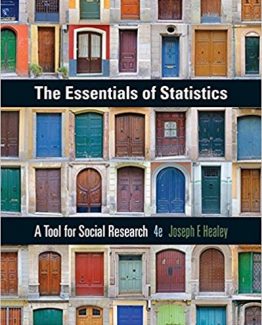The Oxford Handbook of Human Motivation 2nd Edition by Richard Ryan, ISBN-13: 978-0190666453
[PDF eBook eTextbook]
- Publisher: Oxford University Press; 2nd edition (August 13, 2019)
- Language: English
- 560 pages
- ISBN-10: 0190666455
- ISBN-13: 978-0190666453
The field of human motivation has been undergoing a revolutionary shift in the 21st century. What new philosophical assumptions, motivational models, and empirical evidence have emerged? What does this look like in theory and in application? The Oxford Handbook of Human Motivation, Second Edition addresses these key advances made in the field since the previous edition, offering the latest insights from the top theorists and researchers of human motivation.
The volume includes chapters on social learning theory, control theory, self-determination theory, terror management theory, and regulatory focus theory, while also presenting articles from leading scholars on phenomena such as ego-depletion, choice, curiosity, flow, implicit motives, and personal interests. A special section dedicated to goal research highlights achievement goals, goal attainment, goal pursuit and unconscious goals, and the goal orientation process across adulthood. This Handbook also provides practical research and guidance with sections on relationships and applications in areas such as psychotherapy, education, physical activity, sport, and work. By providing reviews of the most advanced work by the very best scholars in this field, The Oxford Handbook of Human Motivation, Second Edition represents an invaluable resource for both researchers and practitioners, as well as any student of human nature.
Table of Contents:
Cover page
Halftitle page
Series page
Title page
Copyright page
Short Contents
About the Editor
Contributors
Table of Contents
Part One: Introduction
1. Inside the Black Box: Motivational Science in the 21st Century
The 20th Century’s Behaviorist Revolution
Behavioral Science Today: Motives, Mechanisms, and Mediation
Meanings, Interests, and Motivation
Motivation and Mechanisms
Motivation: The Most Important Variable in Applied Studies
We Have Come a Long Way …
Part Two: General Theories of Human Motivation
2. Social Cognitive Theory and Motivation
Introduction
Conceptual Framework
Vicarious, Symbolic, and Self-Regulatory Processes
Motivational Processes
Self-Efficacy
Conclusion
Future Research Directions
3. A Self-Regulatory Viewpoint on Human Behavior
Feedback Control
Feedback Processes and Affect
Further Issues Regarding Affect
Affects and Priority Management
Shifts in the Theoretical Landscape: Two Modes of Functioning
Impulse and Control
The How Versus the What of Motivation
Closing Comment
4. Regulatory Focus Theory and Research: Catching Up and Looking Forward After 20 Years
What Is Regulatory Focus Theory?
What Is Promotion Motivation?
What Is Prevention Motivation?
Where Does Regulatory Focus Motivation Come From?
How Is Regulatory Focus Motivation Measured and Manipulated?
Are Promotion and Prevention Different From Approach and Avoidance?
System Level: Promotion and Prevention Goals
The How of Goal Pursuit: Strategies and Tactics
Is One Type of Motivation Better Than the Other?
Trade-Offs in Promotion and Prevention Motivation
It Is the Fit That Counts
Group Dynamics
Metamotivation
Concluding Thoughts
5. A Terror Management Theory Perspective on Human Motivation
Self-Awareness: A Blessing and a Curse
Terror Management Theory
Evidence for the Motivational Role of Existential Anxiety
Conclusion
6. The Nature and the Conditions of Human Autonomy and Flourishing: Self-Determination Theory and Basic Psychological Needs
Motivation and Wellness Within Self-Determination Theory
Contexts and Basic Psychological Needs
Internalization and the Differentiation of Extrinsic Motivation
Outcomes Associated With Autonomous Motivation
Specific Contextual Factors and Autonomous Motivation
Autonomy-Supportive and Controlling Climates
Autonomy Support and Mutuality in Relationships
Pursuing Intrinsic and Extrinsic Aspirations
Attaining Intrinsic and Extrinsic Aspirations
Contextual Effect on Intrinsic and Extrinsic Aspirations
Economic and Political Systems
Part Three: Motivational Processes
7. Ego Depletion: Theory and Evidence
Introduction
Ego Strength
What Causes Depletion
Consequences of Depletion
Challenges to the Robustness of the Depletion Effect
How Depletion Operates
Integration: Effects of Motivation and Conservation
Moderators of Depletion
Building Strength
Overall Conclusion
Future Directions
8. The Complex Role of Choice in Human Motivation and Functioning
Introduction
The Motivation to Choose
Choice as a Motivator
Explaining the Diverse Effects of Choice
Confluence of Constructs
Final Thoughts and the Future of Choice Scholarship
9. Curiosity and Motivation
Curiosity Is Motivation to Reduce Novelty and Uncertainty
Curiosity Is For-Its-Own-Sake Motivation
Some People Are More Curious Than Others
Conclusion
Future Directions
10. Flow: The Experience of Intrinsic Motivation
Dimensions of the Flow State
Conditions of Flow Experience
The Condition–Experience Model
Psychological Covariates of Flow Experience
Conceptualization and Operationalization of Flow-Related Constructs
Emergent Motivation and the Temporal Dynamics of Flow Experience
The Neurophysiology of Flow Experience
Conclusion
11. Implicit–Explicit Motive Congruence and Moderating Factors
Introduction
The Relation Between Picture Story Exercises and Questionnaire Measures of Motives
The Time Has Come to Retire the Independence Hypothesis
Methodological Factors That Influence Estimates of the Implicit–Explicit Motive Correlation
Substantive Variables That Moderate Implicit–Explicit Motive Congruence
Antecedents of Motive Congruence
Consequences of Motive Congruence
Conclusion
Future Directions
12. Interest and Its Development, Revisited
Interest and Its Development, Revisited
Defining Interest and Interest Development
Research on Interest Development
Conclusions
Future Directions
Part Four: Goals and Motivation
13. Achievement Goals
Introduction
Historical Overview
Conceptual Issues in Achievement Goals
Emerging Research in Achievement Goals
Conclusion
Future Directions
14. Goal Attainment
Goals Versus Motivation
Interventions
Conclusion and Outlook
15. Does Goal Pursuit Require Conscious Awareness?
Goal Pursuit Without Awareness: Some Preliminary Thoughts and Findings
Goal Pursuit as Automated Behaviors
Habitual Action Selection
Can Stimuli Trigger Motivation?
Understanding the Unconscious Source of Human Goal Pursuit
The Power of Reward Cues
When Outcome + Reward Information Are (Re)presented in One Instance
Conclusion and Future Directions
16. On Gains and Losses, Means and Ends: Goal Orientation and Goal Focus Across Adulthood
Introduction
The Importance of Goals for Adult Development
Goal Focus: Process or Outcome
Conclusion
Part Five: Motivation in Relationships
17. The Five Pillars of Self-Enhancement and Self-Protection
Introduction
Self-Enhancement, Self-Protection, and Their Functionality
The Five Pillars of Self-Enhancement and Self-Protection Motivation
The Self-Serving Bias
The Better-Than-Average Effect
Selective Self-Memory
Socially Desirable Responding
Overclaiming
Concluding Remarks
18. The Gendered Body Project: Sexual and Self-Objectification as Motivated and Motivating Processes
Theoretical Frameworks on Sexual and Self-Objectification
Objectification as Power and Dominance
Objectification as Existential Protection
Objectification as System Justification
A Matter of Seeing: How Sexually Objectifying Culture Translates to Self-Objectification
Cultivation of Self-Objectification in the Culture of Sexual Objectification
The Situational Motivators of Self-Objectification
Summary
A Matter of Doing: The Motivating but Consequential Body Project
Concluding Comments
19. Relatedness Between Children and Parents: Implications for Motivation
Major Categories of Children’s Motivation
The Attachment Theory Perspective
The Self-Determination Theory Perspective
Beyond Relationship Quality: Children’s Sense of Responsibility to Their Parents
Integrating the Different Ideas About Relatedness
Conclusions
Part Six: Biological Perspectives
20. Motivational Neuroscience
Motivational Neuroscience: Current Status of the Field
Key Brain Structures and Pathways in Human Motivation
Neural Basis of Key Motivations
Conclusion
Future Directions
21. Advancing Issues in Motivation Intensity Research: Updated Insights from the Cardiovascular System
Introduction
Motivation Intensity Theory
Measuring Effort
Empirical Evidence
Conclusions
22. Autonomous Motivation, Internalization, and the Self: A Functional Approach of Interacting Neuropsychological Systems
Self-Determination Theory
Personality Systems Interactions Theory
The Integrative Self
The Discrepancy System
Intention Memory
The Action System
Self-Positivity Bias and Self-Integration: Features of the Self Enabling Self-Growth
Self-Access: Exerting Influence on Behavior by Activating the Self
Neural Mechanisms of Autonomy and Internalization
Conclusion and Outlook
Part Seven: Motivation in Application
23. Motivation in Psychotherapy
Clinically Relevant Motivational Constructs
Personal Goals, Well-Being, and Psychological Problems
Future Research/Open Questions
24. Motivation in Education
Overview
The Nature of Student Motivation
Development of Children’s Motivation
School’s Influences on Students’ Motivation
School Transitions and Changes in Student Motivation
Motivation Interventions
Conclusion and Future Directions
25. Advances in Motivation in Exercise and Physical Activity
Introduction
Three Key Motivational Theories in Physical Activity
Theoretical Advances
Measurement and Methodological Advances
Conclusion
Future Directions
26. Motivational Processes in Youth Sport and Physical Activity
Youth Sport Motivation: From Descriptive to Theory-Driven Studies
Sources and Mechanisms of Influence on Youth Sport Motivation
Translating Theory and Research to Evidence-Based Practices for Promoting Motivation in Youth Sport and Physical Activity
Concluding Remarks
27. Work Motivation: Where do the Different Perspectives Lead Us?
Overview of the Theoretical Perspectives
A Heuristic Conceptual Framework of Motivation and Directions for Future Research
Part Eight: Epilogue
28. Envisioning Progress and Perils: Musings on the Future of Motivation Research in a Rapidly Evolving World
Into the Future
Technology, Human Experience, and Motivation Science
New Methods, New Questions
Motivating People While Respecting Them
Cultural Psychology, Diversity, and Motivation Research
Our Interdisciplinary Future
Index
Richard M. Ryan is Professor at the Institute for Positive Psychology and Education at Australian Catholic University. He is a clinical psychologist and co-developer of self-determination theory, with over four hundred papers and books in the areas of human motivation, personality, and psychological well-being. He earned his Ph.D. in clinical psychology from the University of Rochester and B.A. in philosophy from the University of Connecticut. Ryan has lectured in hundreds of universities worldwide, received many distinguished career awards, held several editorial posts, consulted with numerous organizations, schools, and clinics, and served as an expert on health-care and education initiatives. He is a Fellow of the American Psychological Association, the American Educational Research Association, and the Society for Self and Identity to name a few, and is an Honorary Member of the German Psychological Society (DGP). He has also been a James McKeen Cattell and Leverhulme Fellow and a visiting scientist at the National Institute of Education in Singapore, the University of Bath, UK, and the Max Planck Institute, Berlin. Ryan is among the most cited and influential researchers in psychology and social sciences today, and many of his research papers have been cited in prominent media outlets such as the New York Times, Washington Post, Huffington Post, BBC News, and CNN.
What makes us different?
• Instant Download
• Always Competitive Pricing
• 100% Privacy
• FREE Sample Available
• 24-7 LIVE Customer Support






Reviews
There are no reviews yet.